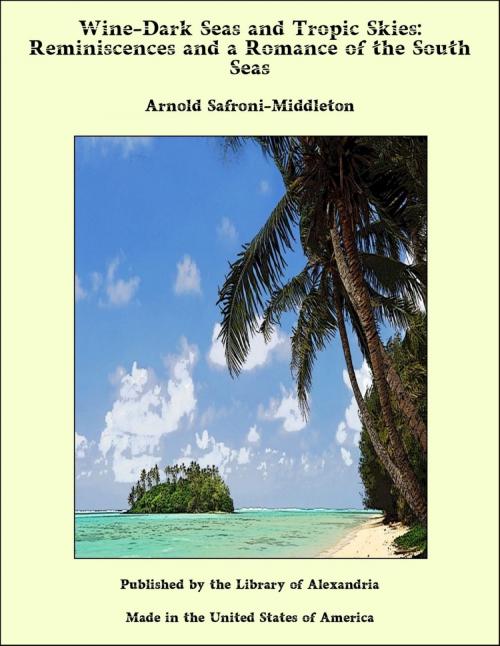Wine-Dark Seas and Tropic Skies: Reminiscences and a Romance of the South Seas
Nonfiction, Religion & Spirituality, New Age, History, Fiction & Literature| Author: | Arnold Safroni-Middleton | ISBN: | 9781465627780 |
| Publisher: | Library of Alexandria | Publication: | March 8, 2015 |
| Imprint: | Language: | English |
| Author: | Arnold Safroni-Middleton |
| ISBN: | 9781465627780 |
| Publisher: | Library of Alexandria |
| Publication: | March 8, 2015 |
| Imprint: | |
| Language: | English |
I HAD been travelling a good deal when at length I left a ship and was stranded for the fourth time in Sydney. In those days the Australian seaboard cities seemed to have come into existence by special grace of Providence. They were kind harbours where Fate could dump, at leisure, impecunious, hopeful youths on the various wharves. Nor do I claim to have been the least hopeful of the multitudinous youths who in my day arrived fresh and green from other lands. I do not think I was “on the rocks” for more than three weeks before the opportunity presented itself, and once more I secured a berth on a schooner that happened to be bound for the islands of the South Seas. I recall that I met an old pal at this period. We had been several voyages together and had shared many exciting adventures, through a deep faith in the impossible and absurd. This pal of mine secured a job on the same ship. I was about sixteen years of age at this time. Crammed with the enthusiasm of romantic youth, nothing seemed improbable, and all that which was hopelessly absurd to the matured mind of man was to me something that glowed with inexhaustible possibilities. And all this notwithstanding the fact that I had already travelled the Australian and New Zealand bush, lived with deported Chinamen in ’Frisco and exiled wild, white men from civilised cities, besides roughing it before the mast on voyages across the world. Also, and not least, I had lived on nuts, green bananas, hard tack and the dubious “locusts and wild honey” of the wildernesses, and much suspicious-looking soup in the cities. One fine morning, as sunrise imparadised the clean waters of beautiful Sydney harbour, off we went. I was delighted to see the steam-tug dragging our schooner from the miserable wharf near Miller’s Point. In due course we arrived at Fiji, where my comrade and I “jumped the ship,” as they say in sea parlance. A few days after arriving in Suva my pal came to me with melancholy aspect and told me that he had fallen in love with a nut-brown lassie. I condoled with him and made strenuous efforts to restore his mental balance, but to no purpose whatsoever. Fiji was a wild enough, God-forsaken, missionary-stricken township in those days, and to finish my last hopes my pal, on the third day, in a paroxysm of grief, eloped into the mountains with a celebrated high chief’s faithless partner—and I saw him no more. A few days after, being quite fed up with Suva, I secured a berth on a schooner and again went seaward across the Pacific. We called at many wonderful isles, which suddenly loomed on the sky-line like enchanted lands of untravelled seas. I could devote chapters to the wonders of that voyage, the strange peoples I met, people wild and romantic, clad in no clothes, beautifully varnished by the tropical sunlight of ages. How they laughed and sang their wonderful songs to the sailors—songs that seemed to have been composed in deep ocean caves and blown into their heathenish brains on patches of moonlight. But I digress. The climax arrived when we reached Nuka Hiva—the shores of the gloriously romantic Marquesan Isles.
I HAD been travelling a good deal when at length I left a ship and was stranded for the fourth time in Sydney. In those days the Australian seaboard cities seemed to have come into existence by special grace of Providence. They were kind harbours where Fate could dump, at leisure, impecunious, hopeful youths on the various wharves. Nor do I claim to have been the least hopeful of the multitudinous youths who in my day arrived fresh and green from other lands. I do not think I was “on the rocks” for more than three weeks before the opportunity presented itself, and once more I secured a berth on a schooner that happened to be bound for the islands of the South Seas. I recall that I met an old pal at this period. We had been several voyages together and had shared many exciting adventures, through a deep faith in the impossible and absurd. This pal of mine secured a job on the same ship. I was about sixteen years of age at this time. Crammed with the enthusiasm of romantic youth, nothing seemed improbable, and all that which was hopelessly absurd to the matured mind of man was to me something that glowed with inexhaustible possibilities. And all this notwithstanding the fact that I had already travelled the Australian and New Zealand bush, lived with deported Chinamen in ’Frisco and exiled wild, white men from civilised cities, besides roughing it before the mast on voyages across the world. Also, and not least, I had lived on nuts, green bananas, hard tack and the dubious “locusts and wild honey” of the wildernesses, and much suspicious-looking soup in the cities. One fine morning, as sunrise imparadised the clean waters of beautiful Sydney harbour, off we went. I was delighted to see the steam-tug dragging our schooner from the miserable wharf near Miller’s Point. In due course we arrived at Fiji, where my comrade and I “jumped the ship,” as they say in sea parlance. A few days after arriving in Suva my pal came to me with melancholy aspect and told me that he had fallen in love with a nut-brown lassie. I condoled with him and made strenuous efforts to restore his mental balance, but to no purpose whatsoever. Fiji was a wild enough, God-forsaken, missionary-stricken township in those days, and to finish my last hopes my pal, on the third day, in a paroxysm of grief, eloped into the mountains with a celebrated high chief’s faithless partner—and I saw him no more. A few days after, being quite fed up with Suva, I secured a berth on a schooner and again went seaward across the Pacific. We called at many wonderful isles, which suddenly loomed on the sky-line like enchanted lands of untravelled seas. I could devote chapters to the wonders of that voyage, the strange peoples I met, people wild and romantic, clad in no clothes, beautifully varnished by the tropical sunlight of ages. How they laughed and sang their wonderful songs to the sailors—songs that seemed to have been composed in deep ocean caves and blown into their heathenish brains on patches of moonlight. But I digress. The climax arrived when we reached Nuka Hiva—the shores of the gloriously romantic Marquesan Isles.















